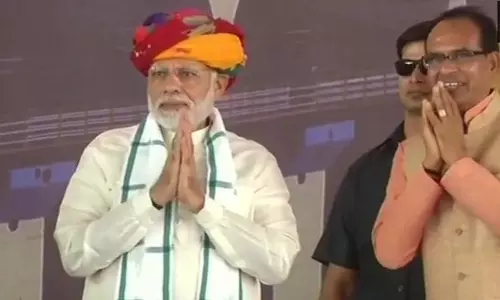
It is the people who suffer from Centre's GST stand
text_fieldsThe central government's stand that it cannot compensate for the loss of states' revenue resulting from the implementation of Goods & Services Tax (GST) is not only a shirking of responsibility, but amounts to a breach of contract and rebellion against the constitution and federal structure as well. When GST was introduced in July 2017, a promise was made to the states by the Centre that loss of their revenue would be made good for five years. But now the Centre is putting forward the specious argument that the Covid crisis was not envisaged at that time. However, the brunt of the burden of facing the pandemic is being borne by the states, not by the Centre. Even when the Centre gave a blow to the people by its unilateral and short-notice declaration of lockdown, what the states received from the Centre was just advisories and directives. Ultimately, the extra financial cost and revenue deficit suffered by the states are far higher than what the Centre experiences.
What would happen if the states also wash their hands off, pleading that this was not expected? And how constitutionally justified would it be, if it is argued that the protection and support the people claim from the governments, are due only if there are no disasters? Although the Centre is in effect ditching the states, by implication it is nothing but a betrayal of the people. Abdicating the moral responsibility of the government towards the people also constitutes a violation of the assurance given by the Centre and patently an anti-people position. Central finance minister Nirmala Sitharaman said at the recent GST Council meeting that out of the antipated compensation cess of Rs 3 Lakh Crore, only 65,000 crores is now expected to be received and the balance Rs 2.35 Lakh Crore was lost mostly because of the Covid pandemic. She added that only Rs 97,000 Cr was lost due to implementation of GST. Thus when the Centre attributes the rest of the loss to Covid, what it says in effect is that it is not legally bound to make up for such deficit.
The Centre's stand is fraught with several issues. Firstly, compensating the states for revenue loss resulting from GST is part of a constitutional mechanism. The GST law does not provide for any of the unforeseen disasters (acts of God) mentioned by the finance minister. The bifurcation of revenue fall into Covid-caused loss and non-Covid caused loss is not only unilateral and illogical, but even the numbers about them are questionable. Secondly, the Centre is bracketing the crisis faced by the economy due to its own acts, with those caused by Covid. When the pandemic hit the already weak economic edifice, its damaging impact was not caused, at least to that big an extent, by acts of god, but by the government. Covid tightened the noose around a financial situation that had even earlier been suffocated by the note-ban and the flawed implementation of GST. Prior to the pandemic, the country had witnessed the lowest Gross Domestic Production (GDP) growth rate (4.2 percent). Thirdly, even if the Centre did not have greater liability than the states, to bear during the crisis, and even if there has not been a dent in GST revenue, the Centre has an obligation to assist the states during the crunch resulting from the impact of Covid. States do not have the powers of economic policy and funds mobilisation which the Centre wields. Even the authority they had was snatched away with the GST regime. Fourthly, even earlier than Covid, which the Centre now cites as the reason to reduce and delay the payment of compensation, the Centre had defaulted in paying up. Right from 2019, the Centre had begun to refuse and delay the share of states – sometimes even as part of pressurising non-BJP ruled states. The Centre's most recent response is that the states can borrow if they so wish - which is yet another step of washing its hands off the burden. If the amount due from the Centre to the states can be given only as loan, it would be fair and reasonable for the Centre itself to take the loan and pass it to states. It is the Centre that will be in a position to reduce both the loan's interest rate and the complexity of drawing it.
Unless sufficient cash flow to the country's economy is ensured through taxes, loans and currency printing, the country is sure to nosedive into a worse situation. Above all this, there is another dimension that comes to the fore now: without strengthening the federal structure, national economy cannot regain its vibrance. For that, the states will need at least a limited amount of economic autonomy. This calls for a rethinking about the excessive authority and leverage wielded by the Centre through the GST regime. It is time the central government realises that excuses like what is used by insurance entities (act of god) does not behove a national government.


















